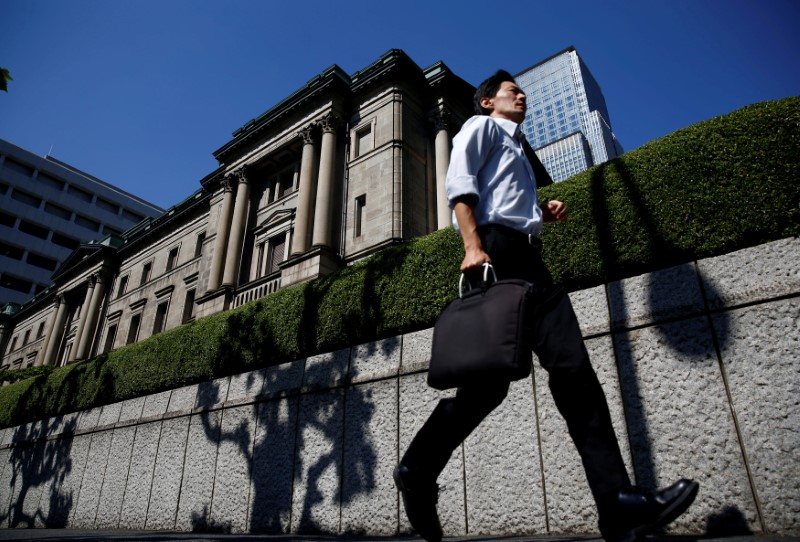 © Reuters. FILE PHOTO – A man runs past the Bank of Japan (BOJ) building in Tokyo
© Reuters. FILE PHOTO – A man runs past the Bank of Japan (BOJ) building in TokyoBy Takaya Yamaguchi and Takashi Umekawa
TOKYO (Reuters) – Influential private-sector members of Japan’s top advisory panel will propose on Thursday that the government delay its time frame for achieving a primary budget surplus to some time after fiscal 2020/21, a draft obtained by Reuters showed.
The private-sector members of the Council on Economic and Fiscal Policy will also ask the government to spend as little as possible on fiscal stimulus in any extra budget it compiles, the draft showed.
The government should also make changes to the tax code to encourage capital expenditure and higher wages, the members will say at a meeting on Thursday, according to the draft.
“There’s a strong chance we could break the back of the economy if we take excessively big measures to achieve a primary budget surplus by fiscal 2020,” the document said.
“We need to take to take more supply-side measures to improve finances and should achieve a primary surplus as soon as we can sometime after fiscal 2020.”
The private-sector members’ thinking is considered close to that of Prime Minister Shinzo Abe, and their proposals often become official government policy.
The proposal, if adopted, would formalize a slippage in Japan’s fiscal targets that began when Abe suddenly dissolved the lower house in September and called a snap election for Oct. 22.
The government’s original goal was to achieve a primary budget surplus budget — excluding debt service and new bond sales — in fiscal 2020/21.
Abe’s ruling Liberal Democratic Party omitted this deadline from its campaign platform for the election and made spending on education and welfare a central plank of its campaign.
Abe’s ruling coalition won the election comfortably, so the government has a strong mandate to boost spending.
Japan’s debt burden is the worst in the world at more than twice the size of its economy, but the delay in the fiscal target has not bothered the bond market much as Japan maintains a huge current account surplus and abundant domestic savings.
However, the long-term risk is that snowballing social security spending for a fast-ageing population will strain government finances, making it more vulnerable to a sudden spike in borrowing costs.
To avoid this risk, Japan’s government has shifted focus away from the primary budget surplus to its ratio of debt to gross domestic product, which is falling because the economy has been growing at a healthy clip.
To encourage more economic growth, the government is considering expanding tax breaks for companies that raise salaries to achieve a 3 percent increase in overall salaries, sources told Reuters earlier on Wednesday.
Fusion Media or anyone involved with Fusion Media will not accept any liability for loss or damage as a result of reliance on the information including data, quotes, charts and buy/sell signals contained within this website. Please be fully informed regarding the risks and costs associated with trading the financial markets, it is one of the riskiest investment forms possible.
Source: Investing.com



























